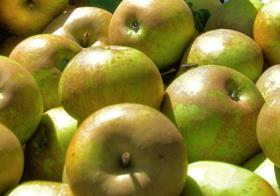
Multinational consumer goods company Unilever is leading new scientific research into fruit varieties which it hopes will lead to the development of healthier products while also underlining its reputation as a major player in the global market for health foods.
The group, renowned for sourcing an estimated 6 per cent of the world's entire tomato crop, has brought together a consortium of the UK's leading scientists – including researchers from Cranfield University in southern England and the Royal Botanic Gardens at Kew in West London – to investigate whether older fruit varieties might contain higher levels of nutrients that are beneficial to human health.
Based on initial tests conducted by Unilever itself on the apple variety Egremont Russet, the new project is set to look at fruits and vegetables including apples, mangoes, bananas and onions, although Unilever spokesman Paul Matthews insisted the research was very much at the initial stage.
'This is about understanding the science behind the plants we eat,' he told Eurofruit. 'It's not just about apples, its about conducting research into the older varieties of fruit and vegetables that potentially could contain higher levels of nutritional content.'
He added: 'We purchase significant quantities of fresh produce in raw material form and so obviously it's in our interest that the nutritional value of what we buy is as high as possible.'
According to Unilever, the project has been set up to identify what are regarded as 'pre-domesticated' plant varieties, ones which have not been altered all that much by modern breeding processes and which, the consortium suspects, could contain 'significantly higher' amounts of nutrients than the varieties currently used in food production.
Unilever's preliminary investigation reportedly found that Egremont Russet apples contained up to 10 times the volume of a certain phytonutrient than found in some modern varieties.
Funded partly by the government-backed Technology Strategy Board, that investigation will now be extended, with Unilever's R&D team confident that other older plant varieties will be richer in nutrients and fibre than newer ones.
Unilever's Dr Mark Berry, who is leading the research project, argued that much of the fresh produce consumed in the world today have been selected for their yield potential, rather than their nutritional value.
'This research looks to turn this approach on its head,' he commented. 'Perhaps a better strategy for human health, not to mention sustainable agriculture, would be to buy plants not based on their weight, but on their nutrient content.'
Older, lesser-known varieties could potentially be brought back into the mainstream market, he added.
'It's fascinating to contemplate that these pre-domesticated varieties have remained relatively unchanged for thousands of years. We'll be going back in time to identify the plants from yesteryear that our ancient ancestors would have eaten - with a view to potentially reintroducing them into our diet.'
Professor Leon Terry of Cranfield University agreed that more recently introduced fruit and vegetable varieties might often lack the health-enhancing properties found in more established, but less prevalent cultivars.
'Although fruit and vegetable-based products like smoothies are widely available, few contain the benefits of naturally high health-promoting phytochemical content from older cultivars,' he insisted.
'This is because the varietal selection of fruit and vegetables supplied by the fresh produce industry today has been increasingly centred on their products' price, size, visual appearance, storage potential and yield.'
Professor Monique Simmonds of the Royal Botanic Gardens said the project would provide an exciting opportunity to investigate the chemistry of less common plants and older varieties of some of the market's favourite fruits.
'It enables us to increase our knowledge about the diversity of phytochemicals in these plants and whether their diversity has decreased during domestication,' she explained.
'In an age when we are losing so much of our biodiversity due to changes in land use we can also evaluate the loss in phytochemical diversity that could have a negative impact on our health.'






No comments yet